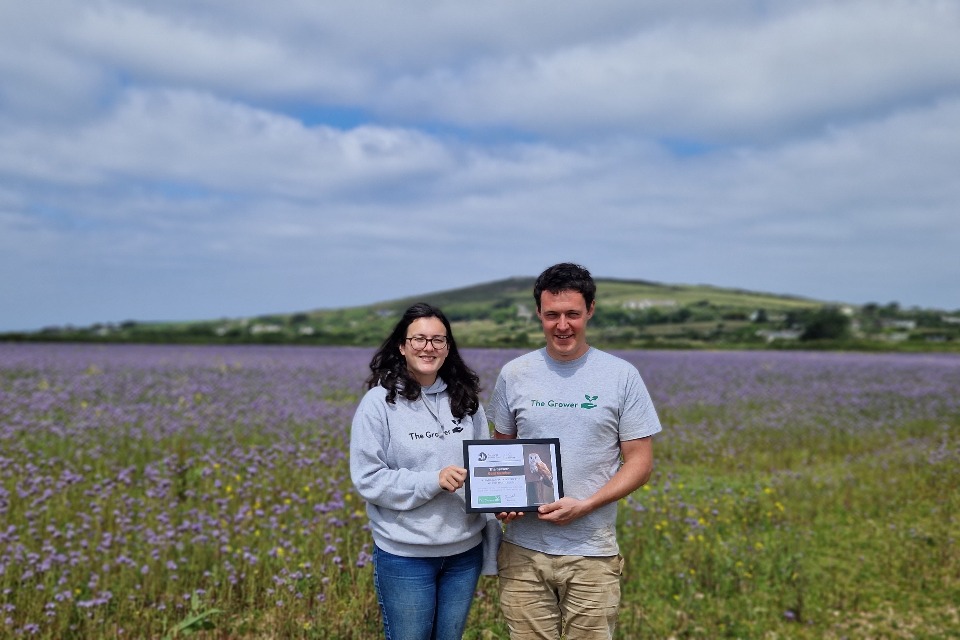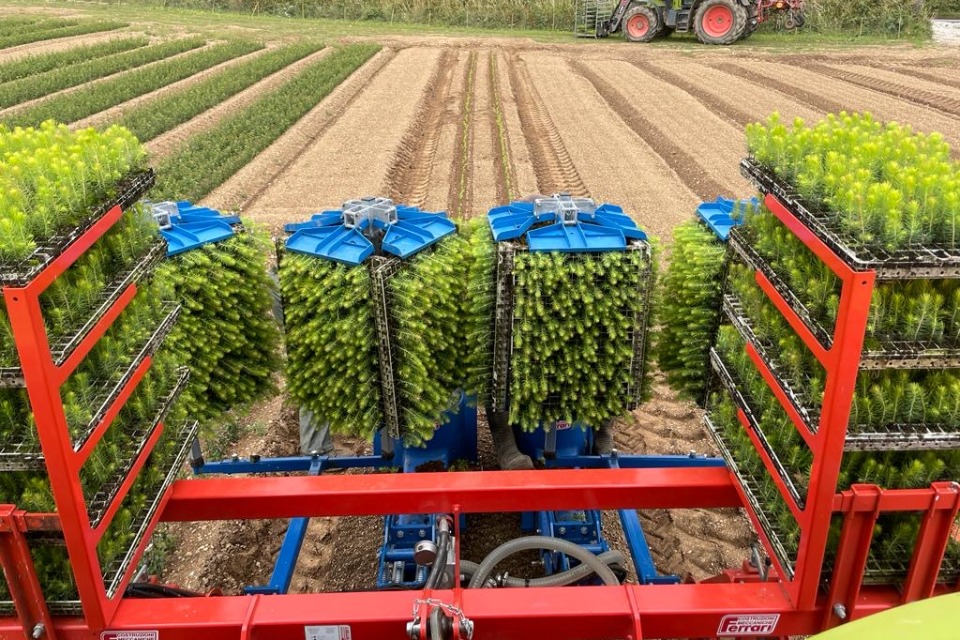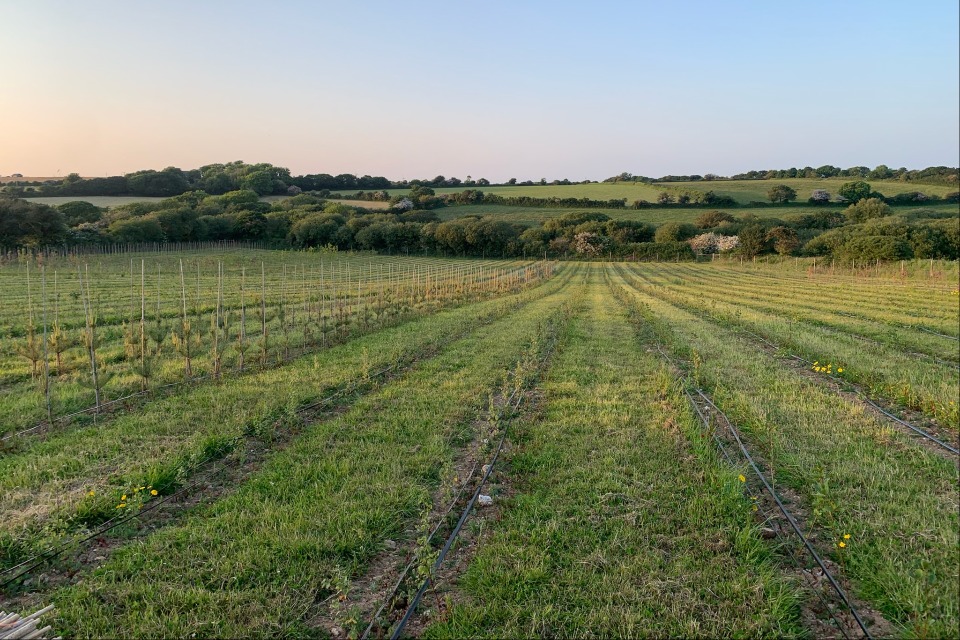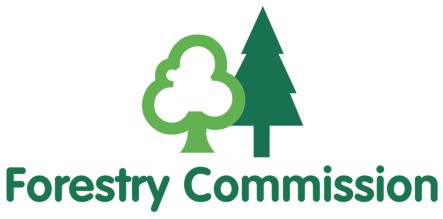The Grower: a Tree Production Capital Grant case study
Published 3 December 2024
Applies to England
The Grower at Presingoll Farm
A pioneering bareroot tree and hedging nursery, based on a regenerative family farm.
Located on the outskirts of St Agnes in Cornwall, Presingoll Farm practises regenerative agriculture. The fourth-generation family-run farm is managed by brothers Mark and Andy.
Mark’s daughter Inez and her partner Chris have introduced an innovative approach to tree production into the farm’s five-year crop rotation – with their tree nursery, The Grower.
The farm is home to Pedigree South Devon Cattle, Pedigree Tamworth Pigs and low input grassland. It grows and sells cover crops, hay and forage with brassicas forming part of the rotation. It has diversified and now hosts a dog walking field, camping and caravan site, education days and seasonal activities such as pick-your- own sunflowers and a pumpkin patch. Young woodlands and extended hedgerows create wildlife habitats and contribute to soil health.
Chris King, Managing Director, The Grower said:
The best thing about growing trees is that long after I’m gone, those trees will still be there.

Chris and Inez in phacelia cover crop holding their Cornwall Wildlife Trust award. © Crown copyright 2024.
A gap in the market
Drawing on their experience in the tree nursery and landscape industries, Inez and Chris observed the declining number of UK-based tree nurseries and suppliers, alongside the increasing interest in tree planting and saw a gap in the market.
With the family farm transitioning from a cattle-based system to arable, they seized on the opportunity to introduce tree production into the crop rotation, using an environmentally minded approach, underpinned by soil health.
They rented land from the farm and sharing equipment for their new enterprise, launched The Grower, a specialist bareroot tree and hedging nursery in 2021.
A unique spin on agroforestry
The Grower tree nursery now grows close to two million trees a year, including hawthorn, dog rose, wild plum and dogwood, and is one of the largest growers of beech in the UK. The nursery aims to produce high quality bareroot trees at a large and efficient scale, with lower inputs, and in an ecologically sensitive way. Inez and Chris describe this as combining the best of conventional and organic systems.
They supply trees to a range of clients, from large wholesalers and forestry companies to small and often local landowners. Currently, broadleaf trees are grown from seed, and conifers from bought-in seedlings that have been grown in compost-filled cells or plugs. Both now form part of the farm’s crop rotation, with about 9 hectares of the farm in tree production at one time. The trees are in the ground for a minimum of 1 year and maximum of 3 years before lifting.
Working with Mark and Andy, the 5-year rotation cycles from trees to clover and other species-rich cover crops, to brassicas, cereals and other crops. Tree production can be hard on the soil, causing compaction and draining nutrients. This rotation paired with regenerative practices has helped improve soil health, with reduced run-off and greater drought resilience. It has meant they can sow or plant earlier, removing the need to irrigate in all but exceptionally dry weather and enables them to lift trees in wet weather conditions.
As one of the most southerly tree nurseries in the UK, their location has been a major factor with trees subjected to coastal and salt-laden winds. The site also experiences a warm and wet microclimate which can cause trees to delay natural defoliation or dormancy until very late in the season. This allows for a longer growing season, however, it is a challenge as the team work to meet customer need for plants for early November. Inez and Chris plan on investing in building a cold store to address this issue.
The numbers
5,000 trees planted on site since 2001.
20,000 metres of planned hedges to reinstate across the site.
6 acres of on-site silvoarable agroforestry trial on the north coast of Cornwall, now in development and planning stage (initial shelterbelts planted in 2022).
1,750,000 trees sold by the Grower as of May 2024.
58,856 trees planted across Cornwall and the south-west.
Grant funding for growth
Through the Farming Equipment and Technology Fund they secured a tractor mounted camera guided self-learning hoe (the Ferrari Remolite Weeder with Autoguidance Pro CameraKit), reducing the need for herbicide application and hand weeding.
In 2022, the Tree Production Capital Grant enabled them to purchase the following essential farming equipment:
- interrow sprayer with front mounted tank to enable targeted chemical weed control between the rows of trees - reducing hand weeding by up to 80-90%, the need for blanket herbicide application and risk of drift
- interrow fertiliser spreader for precision application of granular fertilisers, previously applied by hand, reducing the need for blanket application and wastage
- plug planter, which increased the efficiency of planting from around 3,000 plug plants per day to 50-75,000 per day, enabling an expanded range of trees to be produced

Planting hundreds of conifer plugs with the plug planting machine. © Crown copyright 2024.
Ensuring plant health and biosecurity
The Grower has been Plant Healthy certified since 2023, so they’re able to supply trees to England Woodland Creation Offer funded projects.
Biosecurity and plant health are an essential aspect of the business for Inez and Chris. They provide thorough training for all staff and have high standards for nursery hygiene and crop inspection. They do not directly import any plant material from outside of the UK.
The business must also manage the risk posed by the Saints’ Way trail passing through the farm.
Although the footpath creates an opportunity to engage and educate, it also introduces a biosecurity risk, with hikers potentially bringing in pests and diseases on their boots. No trees are grown in areas with public access, to reduce the risk of spreading pests and diseases into the crops.
Top tips
- talk to people to understand the needs and requirements of the industry and customers, then use this insight to choose what to grow
- look for gaps in the market, there are some niches that need filling
- don’t plant trees later than March to ensure successful establishment
- look after your soil and it will look after you

Bareroot landscape amenity trees in production. © Crown copyright 2024.
Restoring habitats
Improving wildlife at Presingoll Farm is central to their ethos. Since 2021, The Grower’s team have planted 5,000 native broadleaf trees in unproductive parts of the farm, such as wet areas and field corners, equating to 2.5 hectares of woodland. The woodlands were partially funded through the Woodland Trust’s MOREWoods scheme. In 2021, they planted a new orchard of heritage varieties alongside elm and oak.
Inez and Chris have referenced old maps to find lost hedges, which the family plan to reinstate, as well as widening the 20,000 metres of existing hedgerows. Unsold trees from the nursery are used to create new hedges, which include gorse an underused species that Chris and Inez believe stabilises the soil and supports pollinators. Increasing pollinators, including through wildflower strips is a vital part of the farm’s integrated pest management approach.
The couple hosted a community tree planting day where local families helped plant over 350 trees for a mixed native windbreak hedge. The benefits of tree planting on the farm have been wide-ranging. Surveys have shown an increase in birdlife including linnets, skylarks and merlins, while cuckoos, buzzards, slow worms and lizards have also been spotted. Field drainage has improved in waterlogged areas, run-off has reduced and the shade provided by the canopy has been beneficial during droughts.

